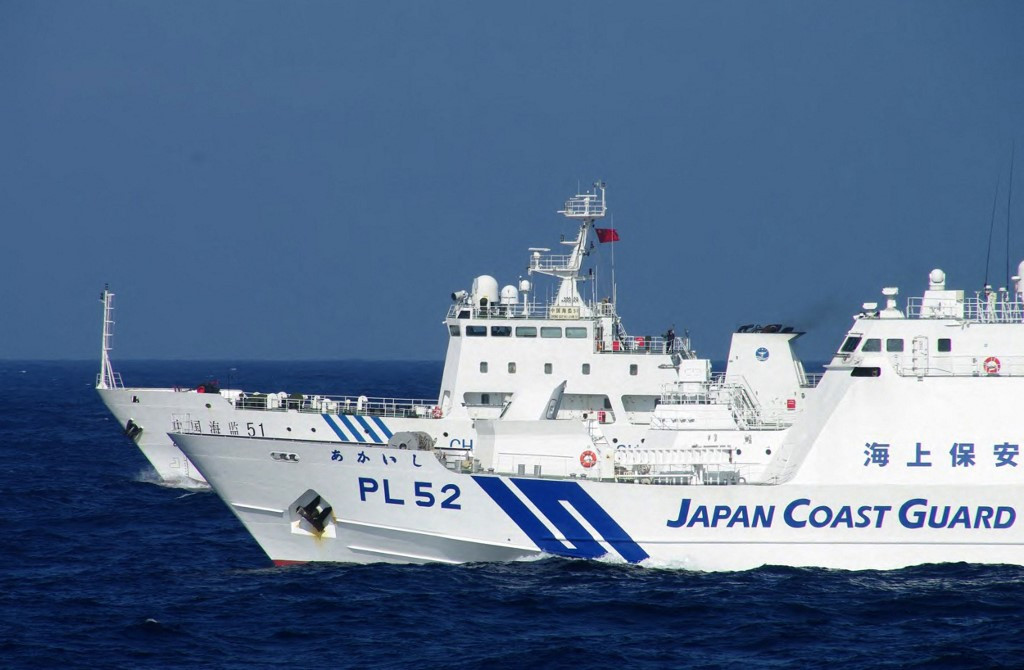Popular Reads
Top Results
Can't find what you're looking for?
View all search resultsPopular Reads
Top Results
Can't find what you're looking for?
View all search resultsJapan, US coast guards hold joint drill amid China's assertiveness
The law explicitly allows the Chinese coast guard to use weapons against foreign ships that Beijing sees as illegally entering its waters, sparking fears in Japan it would target Japanese vessels sailing around the Senkaku Islands.
Change text size
Gift Premium Articles
to Anyone
 This handout picture taken by the Japan Coast Guard on February 4, 2013 shows a Chinese marine surveillance ship (back L) alongside a Japan Coast Guard ship near the disputed islets known as the Senkaku islands in Japan and Diaoyu islands in China, in the East China Sea. Two Chinese government ships on February 4 entered waters around the Tokyo-controlled islands that Beijing claims as it own. Beijing has repeatedly sent ships to the area since Japan nationalised some islands in the chain in September. (Agence France Presse/Japan Coast Guard)
This handout picture taken by the Japan Coast Guard on February 4, 2013 shows a Chinese marine surveillance ship (back L) alongside a Japan Coast Guard ship near the disputed islets known as the Senkaku islands in Japan and Diaoyu islands in China, in the East China Sea. Two Chinese government ships on February 4 entered waters around the Tokyo-controlled islands that Beijing claims as it own. Beijing has repeatedly sent ships to the area since Japan nationalised some islands in the chain in September. (Agence France Presse/Japan Coast Guard)
J
apanese and US coast guard patrol vessels held a joint exercise this weekend near the Ogasawara Islands, about 1,000 kilometers south of Tokyo, amid China's rising maritime assertiveness, the Japan Coast Guard said Monday.
The Japan Coast Guard's 6,500-ton Akitsushima and the US.Coast Guard's 4,500-ton Kimball took part in the drill for around three hours from 9 a.m. Sunday in the waters around the Chichijima and Hahajima islets of the Ogasawara Islands in the Pacific, it said.
The two allies are stepping up efforts to realize a "free and open Indo-Pacific," in a veiled counter to China's rising assertiveness in the East and South China seas.
"Bilateral cooperation is becoming more important," a Japan Coast Guard official said.
In the drill, the patrol vessels conducted joint operations to monitor and track illegally operating foreign fishing vessels as well as onboard inspections and information-sharing exercises.
Calls for such a joint drill had also been growing from some lawmakers of the ruling Liberal Democratic Party following the implementation of a new Chinese coast guard law on Feb. 1.
The law explicitly allows the Chinese coast guard to use weapons against foreign ships that Beijing sees as illegally entering its waters, sparking fears in Japan it would target Japanese vessels sailing around the Senkaku Islands.
Beijing claims the Tokyo-controlled uninhabited islands, calling them the Diaoyu. Its vessels have repeatedly intruded into Japanese waters near the Senkakus, prompting protests by Tokyo.
Meanwhile, later on Monday, China urged US President Joe Biden not to try to create a "small circle targeting a specific country," warning against his attempt to prompt democratic nations to join hands to contain the Communist-led government.
"A line should not be drawn on the basis of ideology," Foreign Ministry spokesman Wang Wenbin told reporters, emphasizing that China will cooperate with other countries to "maintain multilateralism."
At a virtual Munich Security Conference on Friday, Biden called on European and Asian democratic partners to prepare together for what he views as a "long-term strategic competition with China."
Wang said, "China's economic development provides a window of opportunity for the world economy, not a threat," adding Beijing hopes to build cooperative relations with Washington.
Earlier Monday, Chinese Foreign Ministry Wang Yi also expressed eagerness to improve ties with the United States, while seeking the lifting of additional tariffs on the nation's imports, which were imposed by the administration of former US President Donald Trump.
Wang, meanwhile, asked the United States not to interfere in the country's internal affairs such as the Taiwan issue as well as human rights matters surrounding Hong Kong, Tibet and Xinjiang.
Diplomatic sources in Beijing said many Chinese senior officials expect that Democrat Biden will adopt a softer approach to Beijing than Republican Trump, who pursued protectionist trade policies under his "America First" agenda.
But they are also worried that the Democrat favoring liberalism would take a firmer stand on human rights issues in China, unlike the former president, whose tougher stance on Beijing may have been motivated by his desire to gain public support, the sources added.









